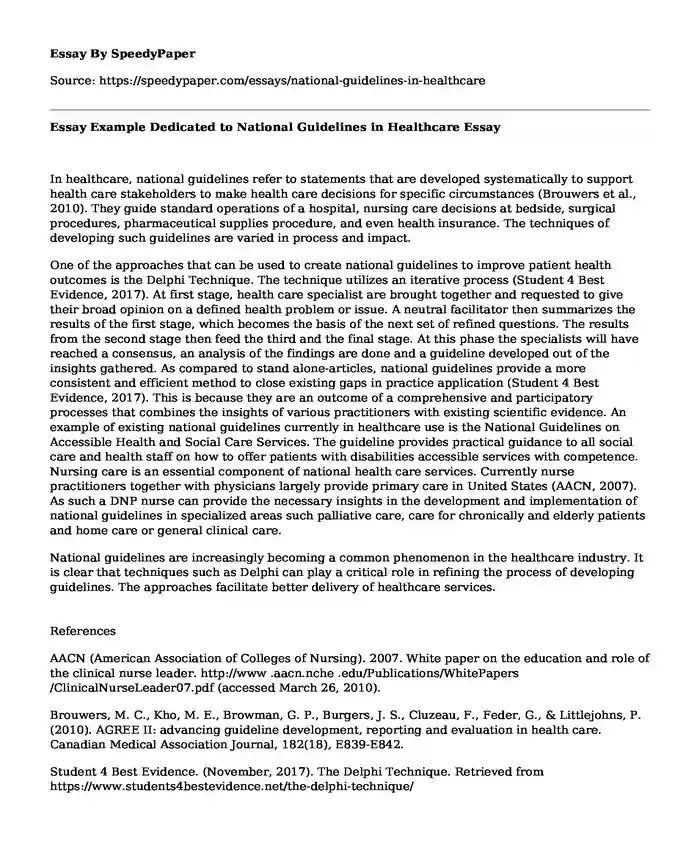
| Type of paper: | Essay |
| Categories: | Health and Social Care |
| Pages: | 2 |
| Wordcount: | 451 words |
In healthcare, national guidelines refer to statements that are developed systematically to support health care stakeholders to make health care decisions for specific circumstances (Brouwers et al., 2010). They guide standard operations of a hospital, nursing care decisions at bedside, surgical procedures, pharmaceutical supplies procedure, and even health insurance. The techniques of developing such guidelines are varied in process and impact.
One of the approaches that can be used to create national guidelines to improve patient health outcomes is the Delphi Technique. The technique utilizes an iterative process (Student 4 Best Evidence, 2017). At first stage, health care specialist are brought together and requested to give their broad opinion on a defined health problem or issue. A neutral facilitator then summarizes the results of the first stage, which becomes the basis of the next set of refined questions. The results from the second stage then feed the third and the final stage. At this phase the specialists will have reached a consensus, an analysis of the findings are done and a guideline developed out of the insights gathered. As compared to stand alone-articles, national guidelines provide a more consistent and efficient method to close existing gaps in practice application (Student 4 Best Evidence, 2017). This is because they are an outcome of a comprehensive and participatory processes that combines the insights of various practitioners with existing scientific evidence. An example of existing national guidelines currently in healthcare use is the National Guidelines on Accessible Health and Social Care Services. The guideline provides practical guidance to all social care and health staff on how to offer patients with disabilities accessible services with competence. Nursing care is an essential component of national health care services. Currently nurse practitioners together with physicians largely provide primary care in United States (AACN, 2007). As such a DNP nurse can provide the necessary insights in the development and implementation of national guidelines in specialized areas such palliative care, care for chronically and elderly patients and home care or general clinical care.
National guidelines are increasingly becoming a common phenomenon in the healthcare industry. It is clear that techniques such as Delphi can play a critical role in refining the process of developing guidelines. The approaches facilitate better delivery of healthcare services.
References
AACN (American Association of Colleges of Nursing). 2007. White paper on the education and role of the clinical nurse leader. http://www .aacn.nche .edu/Publications/WhitePapers /ClinicalNurseLeader07.pdf (accessed March 26, 2010).
Brouwers, M. C., Kho, M. E., Browman, G. P., Burgers, J. S., Cluzeau, F., Feder, G., & Littlejohns, P. (2010). AGREE II: advancing guideline development, reporting and evaluation in health care. Canadian Medical Association Journal, 182(18), E839-E842.
Student 4 Best Evidence. (November, 2017). The Delphi Technique. Retrieved from https://www.students4bestevidence.net/the-delphi-technique/
Cite this page
Essay Example Dedicated to National Guidelines in Healthcare. (2022, Mar 02). Retrieved from https://speedypaper.com/essays/national-guidelines-in-healthcare
Request Removal
If you are the original author of this essay and no longer wish to have it published on the SpeedyPaper website, please click below to request its removal:
- Personal Experience Essay on the Most Difficult Academic Problem
- Free Essay on Child Abuse and Harm
- Law School Entrance Essay Sample
- Black Lives Matter - Free Essay about How the Movement Began
- Free Essay Sample on Drugs Use in Sports
- Essay Sample on the Trends, Issues, And Patterns in Intercultural Communication
- Free Essay Example - WebQuest
Popular categories




